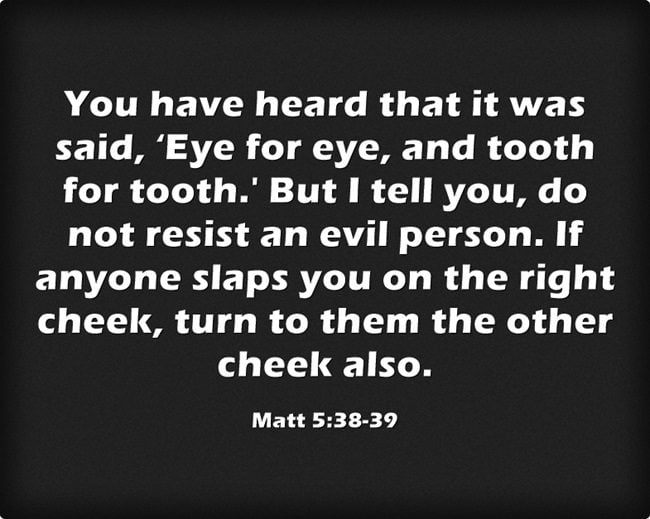Maybe you’ve heard the phrase “an eye for an eye” but what does it mean? Does it mean the same thing under the New Covenant as it did in the Old?
The Old Testament Meaning
In the Old Testament, as with today, witnesses were invaluable in determining whether a crime had truly been committed or not. In Deuteronomy 19:16-17 for example it says that “If a malicious witness takes the stand to accuse someone of a crime, the two people involved in the dispute must stand in the presence of the Lord before the priests and the judges who are in office at the time” however the judges “must make a thorough investigation, and if the witness proves to be a liar, giving false testimony against a fellow Israelite, then do to the false witness as that witness intended to do to the other party. You must purge the evil from among you. The rest of the people will hear of this and be afraid, and never again will such an evil thing be done among you” (Duet 19:18-20). Thereby they should “Show no pity: life for life, eye for eye, tooth for tooth, hand for hand, foot for foot” (Duet 19:21) or in other words, the punishment must fit the crime; no more and no less. The reason for this was so that “the people will hear of this and be afraid” and hopefully, this will be a deterrent to crime. Today, it seems that criminals actually play the victims.
The Death Penalty
God as the Author of Life is the only One Who has the right to take life since He is the life giver and since we are made in the image of God (Gen 1:27), life is sacred, and thus the law, an “eye for eye, tooth for tooth. The one who has inflicted the injury must suffer the same injury. Whoever kills an animal must make restitution, but whoever kills a human being is to be put to death” (Lev 24:20-21). This sort of law was enforced so that justice would be done no matter what a person’s social standing or position in life was. Even among minor infractions, this was enforced but also “if there is serious injury, you are to take life for life, eye for eye, tooth for tooth, hand for hand, foot for foot, burn for burn, wound for wound, bruise for bruise” (Ex 21:23-25).
The New Covenant
Jesus showed that it’s not so much a change in the law due to a change in covenants but there is a higher standard today by which God will judge the world. Jesus said “You have heard that it was said to the people long ago, ‘You shall not murder, and anyone who murders will be subject to judgment” (Matt 5:21). When Jesus said “You have heard that it was said to the people long ago” He is obviously referring to the Old Covenantal laws found in the Old Testament but now “anyone who is angry with a brother or sister will be subject to judgment. Again, anyone who says to a brother or sister, ‘Raca,’ is answerable to the court. And anyone who says, ‘You fool!’ will be in danger of the fire of hell” (Matt 5:22). Jesus equated hating someone as murdering them in their heart. No, it’s not as serious as actually murdering someone but the intent of this could be seen as if someone had opportunity to get away with it, they would. Even where Jesus referred to the Ten Commandments and the law against committing adultery, He amped up this law to reflect what the heart’s intent was, saying “You have heard that it was said, ‘You shall not commit adultery. But I say to you that everyone who looks at a woman with lustful intent has already committed adultery with her in his heart’” (Matt 5:27-28). Lusting in the heart is seen by God as committing the act itself, although certainly the physical act of adultery is far worse. The point is that lusting in the heart happens before the actual physical act does and can lead up to such a grievous sin as adultery.
A Better Covenant
Those who have been born again must resist evil but not in responding in like manner. In the Beatitudes, Jesus said “You have heard that it was said, ‘Eye for eye, and tooth for tooth.’ But I tell you, do not resist an evil person. If anyone slaps you on the right cheek, turn to them the other cheek also” (Matt 5:38-39). If anyone had a right to return evil for evil, it was Jesus as He was God but even “When he was reviled, he did not revile in return; when he suffered, he did not threaten, but continued entrusting himself to him who judges justly” (1st Pet 2:23) so “Consider him who endured such opposition from sinners, so that you will not grow weary and lose heart” (Heb 12:3). We are told, “never avenge yourselves, but leave it to the wrath of God, for it is written, “Vengeance is mine, I will repay, says the Lord” (Rom 12:19) which even in the Old Testament it was stated “You shall not take vengeance or bear a grudge against the sons of your own people, but you shall love your neighbor as yourself: I am the Lord” (Lev 19:18).
Conclusion
Jesus tells us “love your enemies and pray for those who persecute you, that you may be children of your Father in heaven. He causes his sun to rise on the evil and the good, and sends rain on the righteous and the unrighteous” (Matt 5:44-45). The reason being is that “If you love those who love you, what reward will you get? Are not even the tax collectors doing that? And if you greet only your own people, what are you doing more than others? Do not even pagans do that? Be perfect, therefore, as your heavenly Father is perfect” (Matt 5:46-48).
Article by Jack Wellman
Jack Wellman is Pastor of the Mulvane Brethren church in Mulvane Kansas. Jack is also the Senior Writer at What Christians Want To Know whose mission is to equip, encourage, and energize Christians and to address questions about the believer’s daily walk with God and the Bible. You can follow Jack on Google Plus or check out his book Blind Chance or Intelligent Design available on Amazon.
















